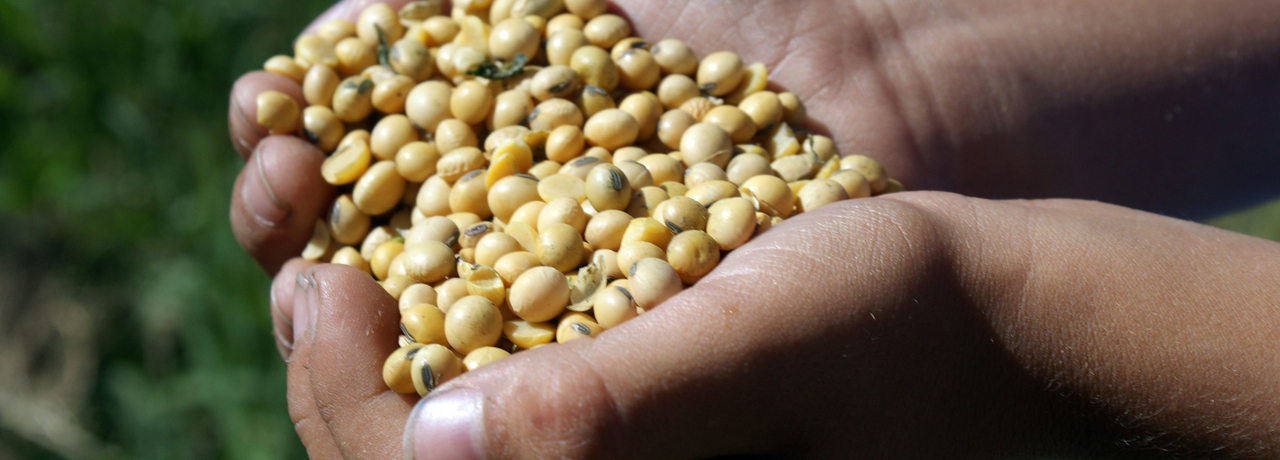Soya procurers, traders and feed manufacturers who offer responsible soya in accordance with the guiding standards are awarded network status. Network status is awarded within the framework of the Soya Network's control concept . Companies with network status may or may not be members of the organisation at the same time.
Standards and certifications ensure sustainability
Even though Switzerland is of little relevance in global soy production and trade, Swiss protagonists played an important role in the development of standards for responsible soy production. The Soy Network Switzerland today holds the function of a role model in disseminating these standards.
The current core standards in detail:
- Basler Criteria for responsible soy production. The criteria were developed in 2004 by ProForest on behalf of Coop Switzerland in collaboration with WWF Switzerland.
- ProTerra Certification Standard for social responsibility and environmental sustainability. The standards were developed Cert-ID on the basis of the Basel Criteria. Since 2019, there is also an interpretation for Europe.
- RTRS Standard for Responsible Soy Production und RTRS Chain of Custody Standard (Non GM Modul). The Round Table on Sustainable Soy Association (RTRS) is an association based in Zurich with an office in Buenos Aires.
- The Danube Soya Standard defines the basic principles and requirements of the Danube Soya program. The Danube Soya program has been established to promote the cultivation, processing and marketing of GM-free, origin -conrolled quality soya from the Danube Region.
- Since October 2015 the Europe Soya Standard exists. It additionally allows the certification of soya in the whole Europe Region.
- International Sustainability and Carbon Certification (ISCC) offers solutions for the implementation and certification of sustainable, deforestation-free and traceable supply chains. ISCC PLUS is a certification system for all markets and sectors not regulated by the RED or FQD, such as the food, feed or energy markets and for diverse industrial applications.
Importers, traders and feed mills that offer responsible soy, obtain the network status:
Importers with network status - members
Traders and importers with network status - no members
Feed mills with network status
Members:
Aachtal Futter AG
Egli Mühlen AG
Granovit AG
Kunz Kunath AG
Meliofeed AG
UFA AG
--------------------------------
Alb. Lehmann Bio Produkte AG
Amrein Futtermühle AG
Brunner AG Mühle Oberembrach
BV Landi March
FEED Produktions AG
Fuhrer Futtermühle
Geissbühler Mühle GmbH
Geisswiesen Mühle AG
Getreide Züri Nord AG
Getreidesammelstelle Thalheim
Grüninger Mühlen AG
Haldemann Mühle AG
Hofmann Nutrition AG
J. Nufer & CO.
J.+W. Iseli Mühle
Kofmel Mühle
Landi Aarau-West AG
Landi Aare
Landi Bernhardzell
Landi Bern West
Landi BippGäuThal
Landi Buchsi
Landi Chénens
Landi Eriswil
Landi Hünenberg
Landi Kleindietwil
Landi KoWy
Landi Luzern-West
Landi Maur
Landi Melchnau-Bützberg
Landi Messen
Landi Moossee
Landi Nottwil-Buttisholz
Landi Region Aemme
Landi Region Langnau
Landi Riedtwil
Landi Sarine
Landi Schneisingen
Landi Sempach-Emmen
Landi Sense-Düdingen
Landi Simmental-Saanenland
Landi Sursee
Landi Thula
Landi Thun
Landi Unterwalden
Landi Wiggen
Ländle Futter
Leibundgut AG
LG Muhen
Moulin Agricole et CC
Moulin de la Plaine
Moulin de Payerne
Moulin de Romont SA
Moulin de la Vaux
Moulin de Vicques Charmillot SA
Moulins Mobiles Sàrl
Moulin du Chêne SA
Mühle Bachmann AG
Mühle Burgholz
Mühle Fischer AG
Mühle Heinz Kohler AG
Mühle Rytz AG
Mühle Scherz AG
Mühle Seengen
Neumühle Rickenbach
Niederhäuser AG
Obermühle Boswil AG / Walzmühle AG
Raymondaz Sàrl
Stettler Samuel Mühle
Stomeg Stettler AG
Strahm Mühle AG
Stricker & Cie AG
Thurtalfutter AG
Urs Wahrenberger Mühle
Utro Fikovit AG
Weibel & Co. AG
Weinlandmühle Trüllikon
Wicki Mühle AG
Checkpoints
As part of the control concept, the procurers work with the following control centres:
Mabesa GmbH – https://www.mabesa.ch/
ProCert AG – https://www.procert.ch/de/startseite-14.html
SQS – https://www.sqs.ch/de
Swiss Safety Center AG – https://www.safetycenter.ch/
Suppliers
2023, the Swiss meat, dairy and egg industries sourced over 95% of their feed soy from Europe. Of the total 220’000 tonnes of imported feed soy, around 180’000 tonnes were imported from Germany and Italy and thus from ADM Straubing and Cereal Docks.
The most important suppliers at a glance:
ADM Straubing has focussed on GMO-free and certified feed soy due to demand from Switzerland. As ADM Straubing sources feed soy from around 12 countries, there is a great deal of flexibility. ADM Straubing is part of the American Archer Daniels Midland Group (turnover 2022: 101.6 billion euros). ADM Straubing started producing biodiesel from rapeseed in 2008. In 2016, it started with 100’000 tonnes of soy (with fenaco as a customer). Today, around 300-350’000 tonnes of beans are processed, over 80% of which are ISCC PLUS certified. Switzerland purchased 60’000 tonnes of this in 2023.
Cereal Docks is an Italian industrial group operating in the first processing stage of the agri-food industry, producing ingredients such as flour, oils and lecithins derived from oilseeds (soy, sunflower and rapeseed) and cereals (maize, wheat, barley) for applications in the food, pharmaceutical, cosmetics, pet food, technical and energy sectors. With six production sites, a headquarters, four logistics centres and a quality and innovation centre, Cereal Docks processes more than 3 million tonnes of cereals and oilseeds every year, thanks to the involvement of more than 17,000 farms from Italian and international supply chains. In 2021, Cereal Docks was transformed into a non-profit company in order to pursue charitable purposes in addition to generating profits. More information can also be found in the company video.


